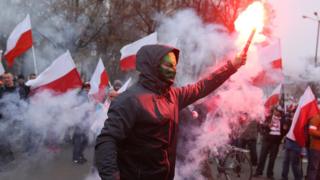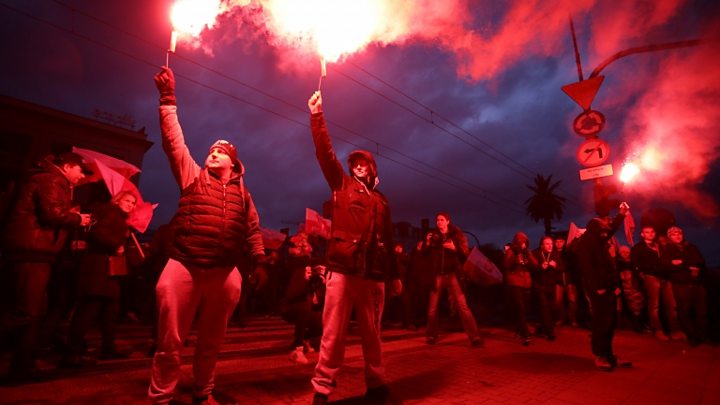 Image copyright
Getty Images
Image copyright
Getty Images
A march in Poland to celebrate the centenary of the country's independence has been overshadowed by a decision to allow far-right groups to participate.
Nationalists were among thousands of people to join celebrations in the capital, Warsaw, which were being led by President Andrzej Duda.
Opposition parties boycotted the march.
It comes as French President Emmanuel Macron urged world leaders marking the centenary of the World War One Armistice to reject nationalism.
Poland's Independence Day commemorates the restoration of the country's sovereignty from the Russian, German and Austro-Hungarian empires in 1918.
Most participants in Sunday's march in Warsaw were seen carrying Polish flags and wearing red-and-white armbands, but some were holding banners representing far-right parties from Poland and Italy.
Many of those attending the march brought red flares that filled the streets with smoke.
President Duda had said he wanted the march to be a proud and joyful celebration and warned that anyone carrying offensive banners or chanting the types of slogans heard at last year's event - such as "Pure Poland, white Poland" - would be dealt with by the police.
Prime Minister Mateusz Morawiecki also said that racist and white supremacist banners displayed during the 2017 march were "unacceptable".
Last week, a Polish court overturned a ban on nationalists marching in Warsaw.
"We're victorious," said the organisers of the annual event, which is partly organised by the far-right National Radical Camp (ONR) and has been marked by violence in recent years.
The march is also popular with thousands of ordinary, patriotic Poles, including supporters of the ruling Law and Justice (PiS) party. An estimated 60,000 people took part in the event last year.

In Paris, Mr Macron made a speech addressing world leaders in Paris describing nationalism as a "betrayal of patriotism" and urging others to "fight for peace".
"By saying 'our interests first and never mind the others' you stamp out the most precious thing a nation has - its moral values," he said.